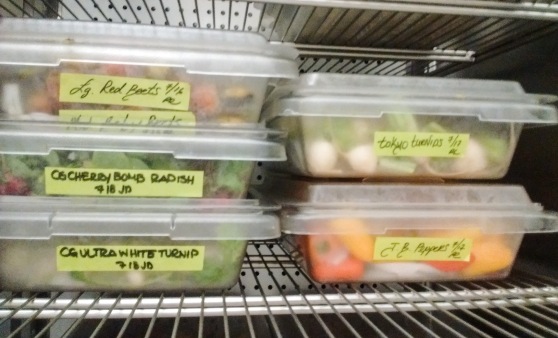My view of how learning takes place has changed in the last year as I have more fully processed my intern experience at Per Se. During my time there I was working in a position within an extremely structured environment that had two goals: provide the kitchen with the best fundamental preparations humanly possible and learn the physical, social and emotional skills necessary to be successful in an extremely stressful environment completely focused on the highest standards of quality in every way imaginable. Design of the workplace played an important role in channeling desired behaviors and simplifying work flow. I also witnessed the power of a culture of extreme attention to detail in execution and organization. When everyone pays very close attention to the most basic fundamentals such as how things are labeled and stored, it builds a habit of doing everything the right way and promotes respect for the ingredients as well as the facility.

Per Se Product Storage [Personal photograph taken in Per Se, NY]. (2015, July 19).
One of the biggest impacts from my Per Se experience was my own reaction to feedback. Towards the end of my internship, there were some newly hired employees coming on board. Everyone must first work as a commis (see diagram below) before working anywhere else so that they have a personal perspective of not only the fundamental techniques but also the organization and culture of the kitchen and the brigade. Some of the stations in the commis kitchen are more demanding than others and one of the newly hired chefs was put on one of the most difficult stations on his first day. In a kitchen that has some of the highest standards of quality and technique in world, feedback is always truthful, but it can also be abrupt and harsh. The new chef was subject to a punishing amount of negative feedback as he struggled on his first day in the kitchen. In the locker room after the shift, I sought to comfort him that his new bosses must have high hopes for him because they had given him such a tough trial on his very first day. He smiled and said it was one of the best days of his career because he knew he was getting exponentially better every time he was criticized. Rather than trying to merely “stay out of trouble” he took all the negative feedback not as a comment on his personal ability or worth but rather an opportunity to learn how to perform to be successful at the highest levels of his industry. I strove from that day on to be a better exemplar of accepting and processing feedback in a more effective way and to frame my own feedback in such a way to encourage a similar perspective in my students. Rather than working to stay out of trouble, the focus is on acceptance and improving in the future.
With student learning, I believe curiosity begets inquiry which facilitates cognitive changes that are affected by an individual’s social, cultural and genetic circumstance. Student agency helps create an environment that encourages them to figure things out, which in turn helps builds new neural connections. I have only meaningfully learned when I wanted to and as a collaborative constructivist I deem that people in my field learn best when they work as a group in an authentic environment with goals, expectations and standards addressing the same needs and circumstances as are found in the industry. The slings and arrows of the everyday professional workplace require organic development of specific physical, mental and personality skills to achieve success and it has been my experience that being exposed to them in a controlled, purposeful way helps to nurture those skills into a meaningful permanence for employees and students. Teachers who “engage students to learn by experience through authentic pedagogy will most likely see the fruits of higher intellectual achievements, not only in classrooms and schools, but more importantly, in their roles as adults as contributing citizens of society.” Knobloch, N. A. (2003). Is Experiential Learning Authentic? Journal of Agricultural Education,44(4), 22-34. doi:10.5032/jae.2003.04022
When you are lacking in faith,
Others will be unfaithful to you.-Tao Teh Ching
Laozi, & Wu, J. C. (1990). Tao Teh Ching. Boston: Shambhala.

Le Coq, F. (2014, August 12). Distrust. Retrieved February 1, 2017, from https://www.flickr.com/photos/fabricelecoq/14979339995
Teachers should be servant-leaders serving the learning of their students. Like a successful workplace, teachers must develop an atmosphere of trust and agency. When students are given meaningful work with clear goals and expectations they naturally create an active, student centered, individualized, collaborative, empowered classroom. When they work in a trusting environment that embraces the significance and power of learning from failure it creates a culture of discovery, prototyping and innovation that emphasizes the skills sought by employers today. Shell, L. (2016, November 22). Why it’s OK to fail: empowering students to discover. Retrieved January 30, 2017, from http://blogs.plos.org/citizensci/2016/11/17/why-its-ok-to-fail-empowering-students-to-discover/

Starbuck, L. (2015, December 17). The Kitchen Brigade. Retrieved January 28, 2017, from http://luckypeach.com/the-kitchen-brigade-eric-ripert-auguste-escoffier/
